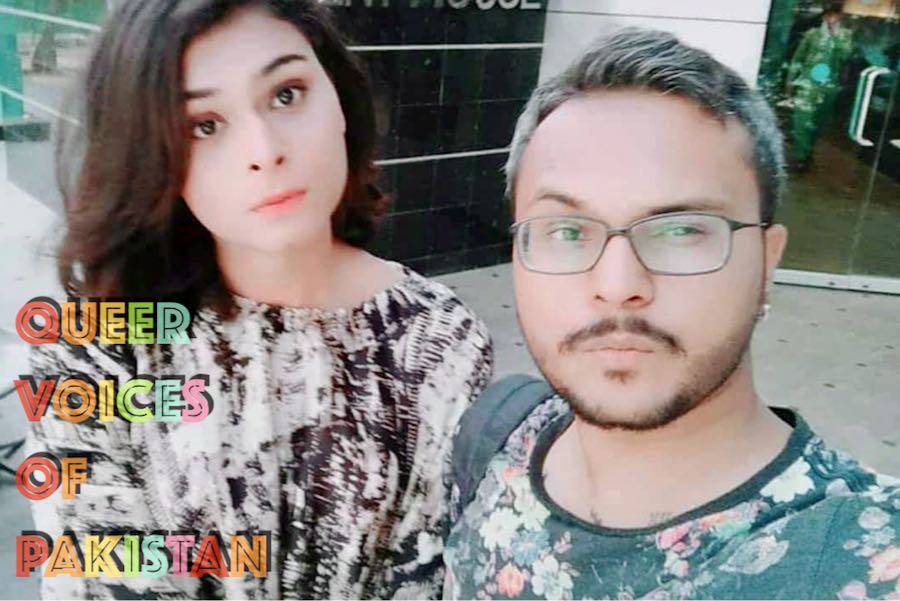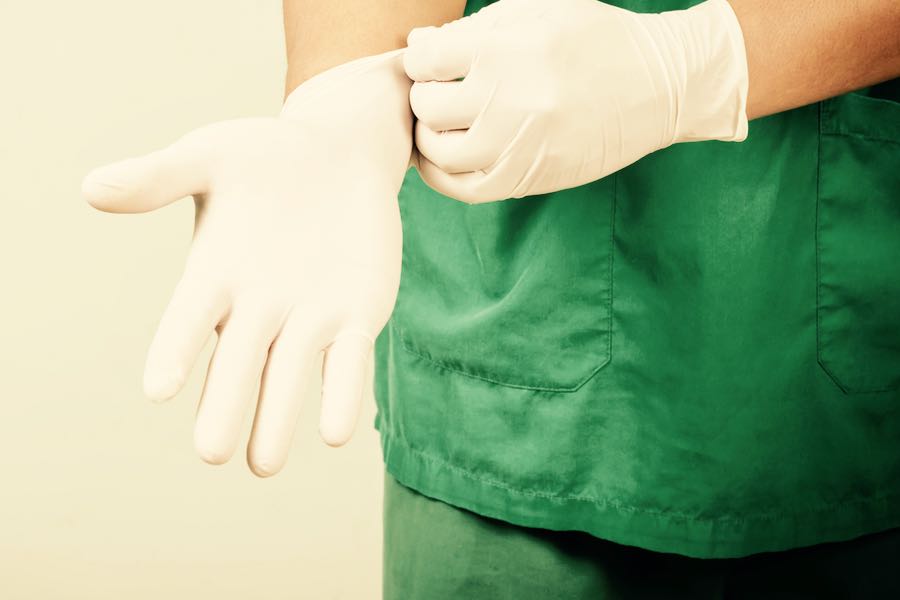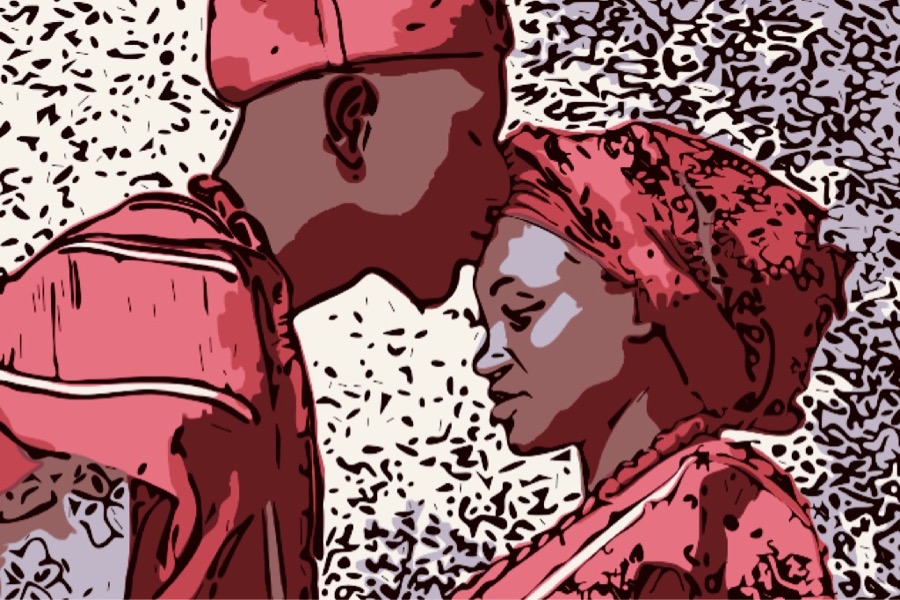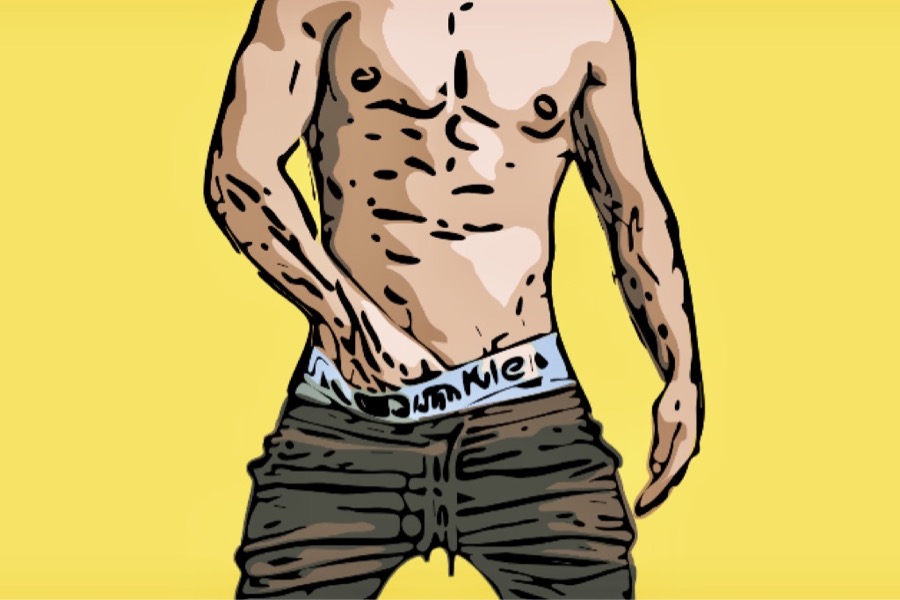Sibling love is unconditional. You never know how much you love them until something happens. You can tell them that you hate them but somewhere inside of you love them more than you think. It is always of utmost importance to thank whomever brought them into your life because they will give you more joy in life than you can imagine.
Salman and Aradhiya, from Karachi, Pakistan are just like any other siblings but what set them apart is their social status and their sexual identity. Salman is the older of the two and acts as right-hand to his younger transgender sister Aradhiya who is a big advocate and supporter of Salman who identifies as gay.
Growing up with Islamic values, in a country where being homosexual can be a crime leading to life imprisonment, Salman had to face a lot of hardships: he was bullied and discriminated against in grade school, as well as in college, and in the work place. He kept his mind strong and discreetly concealed his identity during the initial years of his life
Since he fully embraced his own identity, he has not being ashamed of being gay and today he is a known proponent of homosexuality in Pakistan. Salman started his mission from his home: the place where his younger sibling came out to him as transgender. As a brother he was initially concerned but he promised himself to support and protect Aradhiya.
Today, Salman is a blogger with various local and global forums. He believes in his thoughts, he pens them down in articles to let the world know what it means to be queer and Muslim in Pakistan. He also operates a Facebook page called “Queeristan” which acts as a news source reporting any incidents, happenings and developments for the local and international Queer population. Salman is also associated with a national newspaper as a sub-editor and a reporter.
Aradhiya is a young 20 years old, tall, glamorous, and energetic transgender girl who is ready to bring acceptance and inclusion for the transgender community in Pakistan’s society. Currently, she is General Secretary of “Pechra” an organization working for transgender rights in Karachi. She has been associated with “Sub Rang,” another welfare organization for the queer population, as a community mobilizer. Also, she has been associated with “Sindh Transgender Welfare Network” as area coordination.
Her determination is justified by her active participation in various trainings and workshops for betterment of Transgender status in Pakistan, but her activism is not restricted to Transgender rights: she has been working independently and actively for women’s empowerment, child abuse, and various other causes.
The siblings have come up together, for the first time on the platform of Il Grande Colibri as “Queer Siblings from Pakistan.“

What is your definition of sibling love?
Salman: For me, my definition of “sibling’s love” is doing everything that I can for Aradhiya. She is younger than me and, as the elder brother, I am doing my best to help her when she needs me the most. We share our secrets and she talks about a lot of stuff that she won’t be able to share with anyone else. The trust level that we have is unbreakable.
Aradhiya: Having a sibling is one thing and having a queer sibling is a completely different privilege. Salman has been my secrets keeper since I can remember. Also, the one to whom I came out to first, at a very young age. He was the one who made me feel I was normal, when I was getting a very negative response from everyone else. He has helped me in my activism journey and has supported me in my transition.
How and when did you come out to each other? Did you ever “suspected” of one another?
S.: My coming out journey has been very personal. I first came out to my mother and later to my siblings. We (siblings) were always “suspicious” about each other sexuality. Growing up I had to hide my sexuality from the world at large but coming out to my family has helped. Sharing my life with my Trans sister Aradhiya has helped me even more.
A.: There is no specific story. He knew about me from the very start, after all he is the elder brother. But you cannot be sure unless one opens up. There was a time I was not willing to accept my reality as I was scared,but he helped me come out. He has been a big support to me, I remember an incident when I was sexually abused in school and I had no one to talk to other than him. He hugged me and supported me to overcome that trauma. At times, I wonder what my life would have been if I didn’t have him.
Having a Muslim background, was supporting each other difficult?
S.: At first a little but not now because we eventually came to terms with our queer and trans identities and religion isn’t much of a barrier between us.
A.: Coming out in a Muslim family was not as easy as it sounds, it took a lot of exhausting sensitization sessions with my mother and the other siblings but now we feel blessed that we have this much acceptance. It was a very hard, after I started my transition and with Salman being gay but when our family and friends saw our work for the community as activists we only got appreciation. Because of acceptance of Hijra culture in South Asia, being transgender as compared to being gay is much safer. Although, I am always concerned about Salman as homosexuality has no justification in our Islamic society.
How does it impact your personality, having a family member supporting you?
S.: It has helped me tremendously. When you have someone from your family beside you, it helps you a lot and Aradhiya has always been supportive.
A.: It has a huge impact on my personality as I knew society wouldn’t accept me and it isn’t accepting me. I am glad and feel safe as my family, especially my mother and my brothers accepted me. Whenever I am in trouble, I don’t feel alone since Salman is with me.
You both have been working for the community. Is there anything workwise you disagree upon?
S.: A lot of times we don’t share the same opinion but we do talk it out. I personally do not impose my will but since she’s younger, she’s learning that my guidance is always a source of wisdom and knowledge for her to follow.
A.: Of course there are disagreements, but usually we come to a mutual agreement. Salman is more experienced than me. He was a journalist and an activist way before I became one. He is a wise guy and as a younger sister I usually accept what he says because I believe in him. For instance we both strongly agree that there should be more visibility of gays, lesbians and bisexual people just the way there is big visibility of transgender people in Pakistan.

Knowing the dynamics of Pakistani society: what would you recommended to queer people to be the first step towards family acceptance?
S.: The dynamic of Pakistani society is such that family acceptance is almost unheard, whether the family live within the country or in more advanced Western societies. I would recommend struggling queers and trans youth to gradually talk to their families in order to work their way through the sensibilization of their family. I would also advise the LGBTQIA youth to never impose themselves without sensitizing their families, their reaction would not be exactly what you are looking for. Without a proper preparation it would not be impossible but definitely not easy. So always test them and educated them first about LGBTQIA rights and issues, then open up to them.
A.: I do get approached by young people and people who do not have family acceptance. I just tell them to be themselves and accept themselves first. Families can be softened if one remains consistent but one has to play really safe in this regards. I tell people that it was not easy for me, it took a lot of time. People often say it is easy for me to say but family acceptance is not possible for them. My advice is to wait and always make a slower move. If there is no family acceptance at least accept yourself and then move on.
What do we need in our society to create more acceptance toward queer people within their families?
S.: We have to critically analyze what’s right and wrong without getting into arguments, if being queer is good for oneself and the society; we are talking about rights and well-being of humans here. Humans are unable to find any other way to redeem themselves because this is inherently what they are born with.
As a gay person, I was born gay, I can’t cure or change myself.
The journey into being open and accepting of my sexuality wasn’t so smooth. I was outed by a relative of mine to my mother and elder brother, which scared me a lot. At the time, I was 19 and for 4 years after that I wasn’t able to meet any other man, never loved a soul because I was so scared and concerned about being exposed. I wanted to cure myself but after the passing of my father, I realized I couldn’t hide myself, I couldn’t run away from who I am.
I am born this way and nothing can change that. Families must love their children and care about their happiness. One’s sexual orientation and gender identity is something that they should understand, accept, and love instead of shunning them and trying to cure them of what they perceive to be an illness.
SUPPORT THE FUNDRAISING FOR “ALLAH LOVES EQUALITY”: LET’S GIVE PAKISTANI ACTIVISTS A STRONGER VOICE!
A.: We live in a patriarchal, Islamic society and never think we have played our role. We belong to the colors of rainbow which also means we will always be proactive in everything we take up as a challenge.
I am a transgender woman and people will come up with weird facts and ideas that a transgender woman is not a woman. Even the very educated and feminist crowd in Pakistan do not accept trans- women as women. This is extremely problematic. As an activist people ask me if the transgender community is related to sex work in Pakistan and my response to them is always straight and simple: if the transgender community is related to sex work, who are they approached by? Obviously the society itself. The fault is not in being a sex worker or a transgender, the fault is in the mindset of the society.
What is your response to those who criticize your sexual orientation? What logic do you have to stand up for each other?
S.: We firmly support and stand up for each other. Our sexual orientation and gender identity are sacred to us and also very personal. I believe no one has the right to criticize us and that criticism does not matter as long as we are comfortable and fully confident about owning ourselves as we are. For me, I am gay and I am born this way, nothing in the world can change that even those who perceive us negatively or oppose us can’t undermine our work or our struggle to highlight the plight of the LGBTQI community in Pakistan.
A.: We are the way we are, as we were born this way. I love myself and my body. As a transgender I do have issues, especially when I am asked about the myth of being “Naturally Transgender” at different platforms. I believe that transgender people still have more rights than any other queer category. Our society has zero tolerance for lesbians, gays, and bisexuals and this needs to be highlighted.
Salman, what challenges do you face being part of the patriarchal society and having a transgender sister?
S.: We live in a very conservative, patriarchal, and heteronormative society where queer, transgender, and non-conforming gender identities are frowned upon in the worst possible ways imaginable.
The challenges I face whenever I am with Aradhiya are: teasing, eyeing, and even harassment. It has been very problematic for us to even tolerate those who make fun of us and in particular of my sister she’s everything to me and I want her to be brave and confident with her identity instead of being belittled or ridiculed for who she is.
But Aradhiya always says to me to remain calm and to not take haters seriously. We have grown quite content with such behavior because it’s best to avoid a confrontation since that is what these boys want. This is the very message we preach to all the LGBT community: we should remain at peace with ourselves and not let others get to us.

Aradhiya, how do you cope with situations where the eastern norms hit you as trans woman?
A.: It’s hard to be transgender in a society like Pakistan. Pakistani society is still evolving and the term transgender is still a taboo. There are a lot of people out there who would not consider me as a woman. I belong to traditional Hijra culture so I also have a teacher who is a big support. The majority of the transgender community in Pakistan earn their living by begging on the streets, sex working, and dancing at functions. These ways of living bother those who are not associated with it. It is not the community’s fault, it is not my fault either. Society needs to understand it so that is what I focus on. I try to sensitize people I come across and explain what being a transgender person means.
Pakistan is progressing in terms of transgenders rights. What is your stance on the gay community of Pakistan? Do they have a future there?
S.: I am quite happy with the way transgender rights and empowerment of this marginalized community is moving forward in Pakistan. I don’t want to brag about it but within my individual capacity and with the help of my trans-sibling have always been at the forefront for transgender issues in Pakistan. As a journalist, I have written extensively about the conditions and the positive developments related to the transgender community.
When it comes to gay rights, I am less hopeful that there would be any immediate change leading to more acceptance or visibility of the gay and lesbian community in Pakistan. As a gay person, it is so hard to find healthcare outlets and even find any positive gay role models for young gay men to aspire to. We have a long way to go. As a gay man, my main activism is to highlight that gay people exist and we deserve to be equal citizens of this country. I hope the future generations will also contribute to the strive for greater equality and visibility in Pakistan. I am hopeful that the next generations might contribute but for now, it’s very hard to predict.
A.: I would say I am lucky because Trans rights have been recognized in Pakistan after the historical “Transgender Protection Right Law” was made. Transgenders have a future in Pakistan if everything remains consistent. This year transgender people were able to vote in the general election and I am among those very few transgender women in Pakistan who have got transgender identity card, as well.
But things are horrendous when it come to gays and lesbians. Gays are not safe in Pakistan. As younger sister of a gay brother I am always concerned, especially when Salman is not at home and his mobile phone is off. Anything can happen to him: any fanatic can do anything to a gay person like him at anytime. I think that may be within the next 10 years we could evolve to a point where we could at least talk about gay rights and protection. But currently being gay is extremely dangerous in Pakistan.
Many queer Pakistani end up getting married against their sexual orientation because of family pressures. What’s your thoughts about this?
S.: I think it’s a national crisis that is too often hard to ignore. I personally can’t stand to see queer men and women lives being destroyed by forceful marriage just to appease their families. Unfortunately, many of my gay friends are married now and they have to continue their marriages just to keep their families happy. If that’s what these gay men want who am I to stand against that?
At the same time, I see many gay men having short-lived marriages because their wives divorce them and they end up depressed. We must really take this issue seriously and have greater acceptance of gay relationships in order to also prevent the destruction of straight men and women, especially women who, in our society, have no option but to get them married. What crime did those straight women have done to deserve a life of servitude and slavery? We must work together to achieve more empowerment and inclusion of the LGBT community to solve such pressing social issues.
A.: I have come across a lot of gay and lesbian people getting married against their sexual orientation but they usually get into depression and anxiety. Many want to commit suicide and if they end up having a child, the suffering is eventually transferred to the child. My plea to parents is that they should try to understand the sexual orientation of their own children, because it’s about their happiness.

Activism can bring life-threatening events: what keeps you going?
S.: Activism in a society like Pakistan is a tough job. I see myself as an intersectional activist and journalist as I work towards highlighting environmental, human, and gender rights which I believe significantly impact each other lives. For example, I am not only gay, I am also ethnic. Growing up in Pakistan as “Urdu speaking” has been tough since I moved back here from Abu Dhabi, UAE where I was born. The racism and discrimination I’ve faced have been immense.
Similarly, as a working-class individual, I had to struggle with jobs and completing my education so I can relate to the struggles of oppressed groups whether it is laborers, women, non-Muslim or ethnic minorities. I strive for rights for all, not just gender and sexual minorities from an oppressive regime with regressive, conservative and also crony capitalist ideologies.
I have personally faced a lot of threats: verbal confrontations, physical attacks, online death threats, and even getting detained by the police because I’m a human rights activist. It’s quite hard to stand up for someone else. I do that because I believe if we have only this one life to do something good than we better contribute to changes and well-being of the people we care about because there is nothing greater than caring about people, environment, and even animals. I believe in being selfless and dedicated in your work.
A.: For me it’s about do and die. As an activist, when I go out to speak about an issues which have never been talked about is very risky. I do get threatening messages and calls and I have been threatened to be raped, beaten or even killed. But when I see myself as an individual, I think that I am marginalized in every possible way. As a transgender woman, I am part of the gender minority, as a urdu speaking (those whose ancestors migrated from India at the time of independence) I am a minority in Pakistan, so all of this has made me more stone hearted. If I can be part of the change in a society then why shouldn’t I be?
What message would you like to send to the queer community of Pakistan and rest of the world?
S.: My message to the queer community of Pakistan and the world is simple and clear: “Love is what makes us who we are!” We must promote love and acceptance of all around us, we can’t discriminate against people within our LGBTQIA circles because of age, colour, race, class or religion. We can’t impose restrictions and shun those who we think don’t belong with our groups. We must be proud of our gender identities, our sexuality, and own our pride with love and acceptance for all.
For the Pakistan LGBTQIA community is time to be who you are and to resist the forces out there that are standing against your love and your feelings. My message to the world is to accept us as their own, to accept the entire LGBTQIA community, starting from the Muslim and African majority especially within the 72 countries where homosexuality is criminalized and banned as the “forgotten children” of this world, whose conditions are being ignored and unheard of. We need your support and love, without your helping hand it would be impossible for us to truly embrace ourselves and strive for greater equality, visibility, and love for all.
A.: The world is not as good as it seems to be when you are struggling with a lot of things at the same time: personal acceptance, family understanding, and social acceptance but you will survive if you stay strong. Never blame yourself for anything and never consider yourself abnormal, because you are as normal as any heterosexual person. My message to the world is peace, love, and equality. We should help and love each other without any grudges and bad feelings. Unity and togetherness are the only thing than can create a peaceful world.
Faysal Zia (Sunny)
©2018 Il Grande Colibrì
photos: Salman and Aradhiya for Il Grande Colibrì
Read also:




